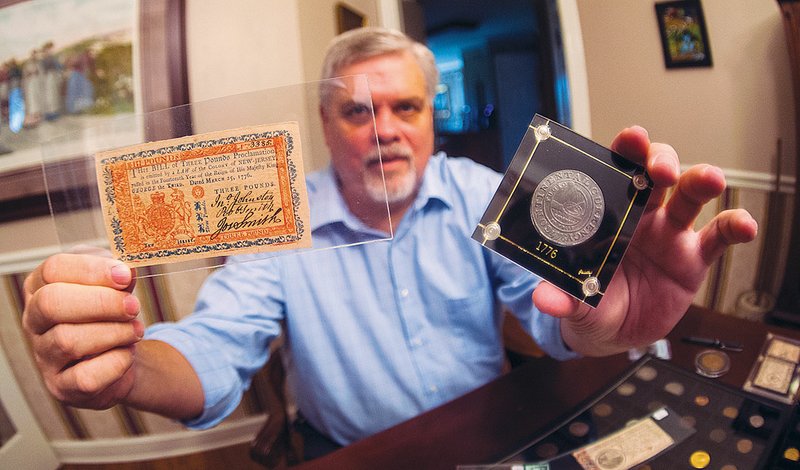CONWAY — Will Nipper of Conway can’t remember a time he was not interested in collecting coins.
“I guess I was about 5,” he said when asked how long he has been a numismatist (coin collector). “I’ve been collecting over a 50-year period.”
Nipper, 55, is especially interested in the coins from the Colonial period of American history.
“There are about 600 [people] or so who collect from this period,” he said. “We’re a pretty limited bunch.”
Nipper has been chosen to receive an award from the Colonial Coin Collectors Club (C4) for his book In Yankee Doodle’s Pocket: The Myth, Magic and Politics of Money in Early America. He will receive the C4 Book Award, which is a silver medal, during the organization’s 20th annual convention Oct. 30 in Baltimore, Maryland.
The convention is being held in conjunction with the Coinage of the Americas Conference, which is jointly sponsored by C4 and the American Numismatic Society. Nipper, who helped organize C4 in 1993, said both groups are national membership organizations that promote study and appreciation of numismatic history.
Nipper said he definitely plans to attend the convention.
“It’s usually held in Boston, but it will be in Baltimore this year,” he said. “I haven’t missed a convention yet.”
Nipper said he took 10 years to write the 576-page hardback book, which he published himself in 2008 through Bowmanstone Press Inc.
“I wanted to leave a legacy for my kids,” he said.
Nipper and his wife, Debbie, have four daughters: Kelsey, Shelby and Abby, who are all in college, and Brinley, who is in the first grade.
“They don’t understand why Dad loves coins so much,” he said with a smile. “I don’t remember when I wasn’t interested. But it’s always been about the history and never the investment.”
Nipper estimates he has about 1,000 coins from the Colonial period.
“I keep nothing at the house,” he said, noting that his collections are stored in a safe-deposit box at a bank.
Nipper said the story of the development of early American money closely follows the evolution of the colonies.
“One thing about the United States is that it is very diverse,” he said. “It always has been. In the beginning, there were a lot of colonies, cultures, languages and economic models. There was a need to tie them together, a need to trade and have commerce.
“All Europe wanted to do was extract wealth from the colonies,” he said. “[European leaders] didn’t give the Colonists anything to do business with. The colonies were not allowed to make coins.
“It is my thesis that if you look at the coins, the paper money, the trade items for the last 250 years dating back to the late 1570s, you can track the emergence of the American nation,” he said. “My book is the story of America as told through the institution of commerce. It is a history book illustrated with money.”
The oldest coin Nipper has is a Massachusetts silver coin that dates to the 1650s.
“It was the first one made in America,” he said. He has a 1652 pine-tree shilling as well.
Nipper also has a 1776 Continental dollar, which he said was designed by Benjamin Franklin. It was made of pewter, and the imprinted mottoes read “fugio,” which Nipper said is short for “tempus fugit” or “time is fleeting,” and “mind your business.”
He said the meaning of these mottos could be interpreted as “Time is getting away. Get to work minding your commerce.”
Continental paper money was also issued during the 1770s.
“It was printed to finance the Revolutionary War,” Nipper said.
Nipper’s collection of Colonial American currency includes coins that were made through 1840, which he said was the beginning of America’s Industrial Age.
“That’s when I stopped,” he said. “The U.S. Mint opened in 1793, and by 1840, with the [invention of] steam presses, it was finally able to catch up with public demand. Before then, all of the coins were handcrafted.”
He said he also collects modern-day coins but keeps them separate from his Colonial America collections. He buys from established dealers and tries to see the coins personally before he makes an investment.
Nipper grew up in Beebe. He graduated from Beebe High School in 1977 and from the University of Central Arkansas in Conway in 1982 with a Bachelor of Science degree in mathematics and computer science, and minors in physics and history.
In addition to his affiliation with the Colonial Coin Collectors Club, Nipper is also a member of the Central Arkansas Coin Club, which meets at 6:15 p.m. the third Thursday of each month at Parkway Place Baptist Church, 303 Parkway in west Little Rock.
“We are also trying to get a coin club started here in Conway at the senior center,” he said. “We meet at 6 p.m. on the first Thursday of the month.”
The next meeting of the Conway group will be at 6 p.m. Oct. 2 at the Ola and John Hawks Senior Wellness and Activity Center, 706 E. Siebenmorgen Road. Call the senior center at (501) 327-2895 for more information.
For more information on Nipper and his book In Yankee Doodle’s Pocket, call him at (501) 514-0785 or visit www.bowmanstonepress.com. The book is also available at www.amazon.com.
